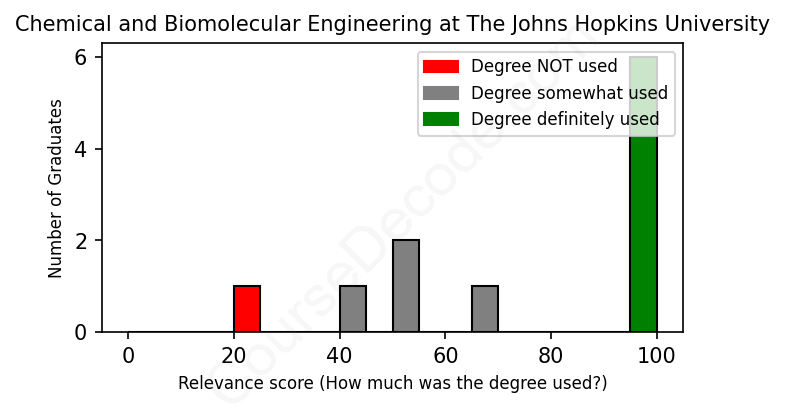
First, some facts. Of the Chemical and Biomolecular Engineering graduates from The Johns Hopkins University we've analyzed , here's how many have used (or NOT used) their degree in their career:

These are estimates based on AI analysis of 11 LinkedIn profiles (see below).
The verdict? Above average. Overall, with an average relevance score of 75%, Chemical and Biomolecular Engineering graduates from The Johns Hopkins University have a higher likelihood (+8%) of finding work in this field compared to the average graduate across all fields:
And for comparison, here's the chart for all profiles we've looked at across all degrees.
Also, after graduating, 72% of these graduates have pursued further education other than another Bachelor's degree (such as a Masters degree or other), compared to the average across all profiles of 35%. This suggests you may need more than just a Bachelors degree to be competitive as a Chemical and Biomolecular Engineering graduate.
See the details:
|
Relevance score: 40% We think this person has NOT gone into a career related to their degree. We think this person has NOT gone into a career related to their degree.
DEGREE INFOGraduated in 2020 from The Johns Hopkins University with a Bachelor of Science - BS in Chemical and Biomolecular Engineering. No other secondary education since. JOB HISTORY SINCE GRADUATIONTechnical Operations Engineer Merck Jun 2020 - Jun 2021 Emergency Medical Technician  Fallon Ambulance Service Aug 2021 - Oct 2021 Medical Assistant  Newton-Wellesley Hospital Oct 2021 - Apr 2023 ABOUTExperienced Research Assistant with a demonstrated history of working in the hospital & health care industry. Skilled in Microsoft Word, Communication, Leadership, Matlab, and Microsoft Excel. Strong research professional with a Bachelor of Science - BS focused in Chemical and Biomolecular Engineering from The Johns Hopkins University. |
The top 10 most common jobs done by the graduates we've analyzed (ranked most common to least) are:
From the analysis of LinkedIn profiles of individuals who graduated with a degree in Chemical and Biomolecular Engineering from The Johns Hopkins University, it's clear that many of them have pursued careers closely relevant to their field of study. The most common jobs these alumni have held include various roles in pharmaceutical and biotechnology companies, research positions, and engineering roles in materials and chemical processes. For instance, positions such as Research Assistant, Associate Scientist, and Senior Research Associate popped up frequently, often focusing on drug development, process engineering, or analytical development. These roles leverage the skills learned during their studies and show how the degree is highly applicable in real-world settings, particularly in the areas of life sciences and chemical development.
However, not all positions taken by graduates directly connect to Chemical and Biomolecular Engineering. Some individuals found themselves in roles such as Line Cooks or Data Analysts, which, while they may utilize some skills indirectly related to their education, don't primarily focus on engineering principles or processes. It's kind of surprising to see some people veer off into fields that seem entirely unrelated, but it highlights the diverse career paths that students can take after graduation. Overall, while many of these jobs are relevant and closely aligned with the graduates’ degrees, there are instances where the connection to Chemical and Biomolecular Engineering is more tenuous.
Here is a visual representation of the most common words in job titles for Chemical and Biomolecular Engineering graduates (this is across all Chemical and Biomolecular Engineering graduates we've analyzed, not just those who went to The Johns Hopkins University):

Graduates from the Chemical and Biomolecular Engineering program at Johns Hopkins University tend to start their careers in roles directly aligned with their field. For instance, many find positions as engineers or research associates shortly after graduation. The data shows that early roles often involve hands-on experience in research, development, and support for pharmaceutical companies, biotech firms, and manufacturing industries. This trend suggests that graduates are able to leverage their education to secure relevant positions that utilize their technical skills. However, there are a few exceptions, such as those who pursued roles in the culinary world shortly after graduating, which might indicate a confusion or exploration outside their primary field of study.
Fast forward five to ten years, and the picture appears quite promising for a majority of these graduates. Many seem to progress into senior scientific roles, managerial positions, or specialized functions within successful companies like Gilead Sciences, Amgen, and Bristol Myers Squibb. These trajectories reflect strong career advancement in the chemical and biotechnology industries, showing that those who stick to jobs in related fields generally see their careers flourish over time. However, there are still instances of graduates wandering off into careers that are less connected to Chemical or Biomolecular Engineering, which may not leverage their full potential. Overall, the trend indicates that a degree from Johns Hopkins in this discipline can open solid doors, leading to fulfilling careers predominantly within relevant sectors.
Getting a Bachelor’s degree in Chemical and Biomolecular Engineering, especially at a reputable school like Johns Hopkins, is quite challenging—likely harder than your average degree. You'll be diving deep into tough subjects like thermodynamics, fluid mechanics, and chemical reaction engineering, which can be pretty intense. The math and science courses can really test your problem-solving skills and time management, so you’ll need to be ready to put in some serious hours studying. On the flip side, the hands-on labs and projects can be super engaging, so it’s not all rote memorization and equations. Overall, if you're passionate about the subject and willing to put in the effort, you can definitely get through it, but don’t underestimate the workload!
Most commonly, in the LinkedIn profiles we've looked at, it takes people 4 years to finish a Bachelor degree in Chemical and Biomolecular Engineering.
So, looking at these grads from Johns Hopkins, it seems like a lot of them are doing pretty well financially, especially the ones who landed spots in big companies like Vertex Pharmaceuticals, Gilead Sciences, and Bristol Myers Squibb. Those positions are generally known to pay well, particularly as they climb the ranks to roles like "Senior Associate Scientist" or "Manager." However, there are a couple of outliers, like the 2018 grad who appears to be doing kitchen work, which probably isn’t raking in the big bucks compared to the engineering and research roles. Overall, if you’re looking at job prospects, a degree from Hopkins in Chemical and Biomolecular Engineering seems to set you up for a good shot at decent money!
Here is a visual representation of the most common words seen in the "about" section of LinkedIn profiles who have a Bachelor degree in Chemical and Biomolecular Engineering (this is across all Chemical and Biomolecular Engineering graduates we've analyzed, not just those who went to The Johns Hopkins University). This may or may not be useful:

Here are all colleges offering a Bachelor degree in Chemical and Biomolecular Engineering (ordered by the average relevance score of their Chemical and Biomolecular Engineering graduates, best to worst) where we have analyzed at least 10 of their graduates:
| College | Score | Count |
|---|---|---|
 Georgia Institute of Technology Georgia Institute of Technology
|
75 | 28 |
 The Johns Hopkins University The Johns Hopkins University
|
75 | 11 |